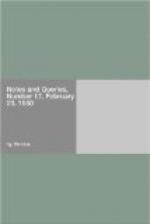Query IX.—In Holme’s Academy of Armory and Blazou, Chester, 1688, p. 289, we find a Dodo figured as an heraldic device, a fac-simile of which is given in the Annals of Natural History, 2nd series, vol. iii. p. 260. The author thus describes it: “He beareth Sable a Dodo or Dronte proper. By the name of Dronte. This exotic bird doth equal a swan in bigness,” &c. &c. Now I wish to ask, where did this family of Dronte reside? Is anything known concerning them? How did they come by these arms? and are any members of the family now living?
Query X.—From a passage in the Histoire de l’Academie Royale des Sciences, 1776, p. 37, it appears that Pingre the French astronomer, published, or at least wrote, a relation of his voyage to Rodriguez, in which he speaks of Solitaires. Is this the fact? and if so, what is the title of his work?
H.E. STRICKLAND.
* * * * *
ON PASSAGES IN COLERIDGE’S CHRISTADEL AND BYRON’S LARA. TABLET TO NAPOLEON.
I am one of those who look upon the creations of our great poets as deserving illustration almost as much as actual history; and I am always distressed when I meet with passages representing events with respect to which I cannot make up my mind as to what the author meant, or intended his readers to believe. Two of these occur to me at this moment, and I shall be much obliged by any of your correspondents giving, in your pages, brief replies to my queries, or referring me to any published works where I may find their solution.
1. What did Coleridge mean to represent or imply in his tale of Christabel? Who or what was Geraldine? What did Christabel see in her, at times, so unutterably horrible? What is meant by “the ladye strange” making Christabel carry her over the sill of the portal? &c., &c. {263}
2. What does Byron mean us to infer that Lara saw in his hall that midnight, when he so alarmed his household with
“A sound, a voice, a shriek, a fearful
call,
A long loud shriek—and silence.”?
The poet, it is true, seems to refuse, purposely, to let his readers into the truth, telling them:—
“Whate’er his frenzy dream’d
or eye beheld,
If yet remember’d, ne’er to
be reaveal’d,
Rests at his heart.”
But still, I conceive there can be no doubt that he knew the truth (I speak as of realities), —knew what he intended to represent by so full and elaborate a delineation of a scene. And it is the author’s meaning and intention that I wish to come at.
I will ask one more question relative to this magnificent poem (which I don’t think has had justice done it by the critics), but one respecting which I hardly think there can be any doubt as to the author’s secret meaning:—Is not the Kaled of Lara the Gulnare of the Giaour?




